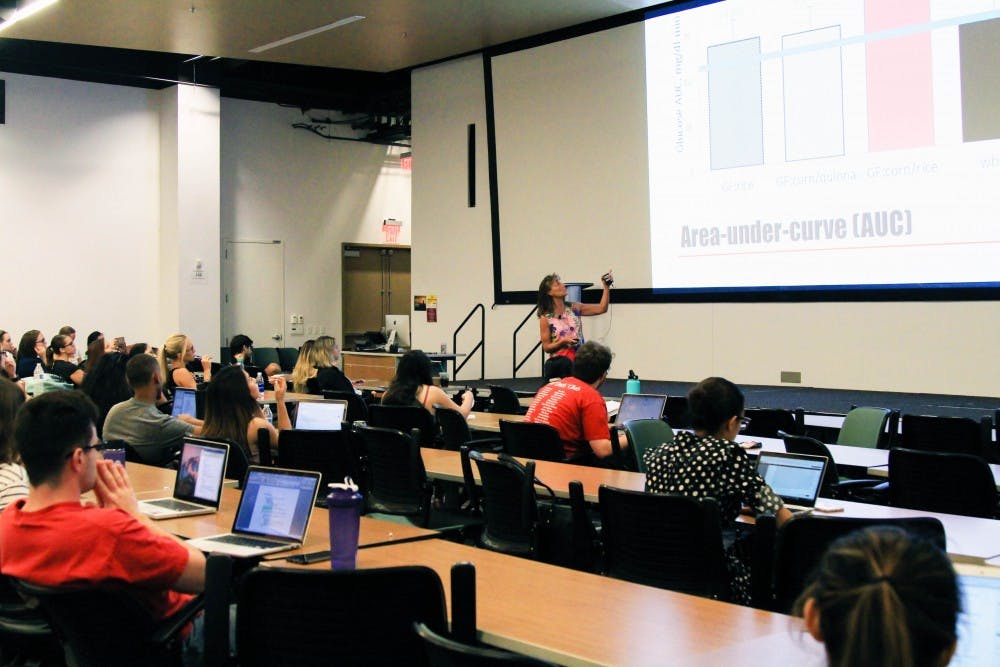While the gluten-free trend has increased in popularity in recent years, the diet can be harmful if its adherents aren't aware of the ingredients they are putting in their mouths, according to one ASU researcher.
Carol Johnston, Ph.D, professor and associate director of the nutrition program in the School of Nutrition and Health Promotion, hosted an undergraduate research colloquium that discussed the benefits and detriments of eating gluten free on Sept. 27 in the Health North building on the Downtown Phoenix campus.
According to Google Trends, the gluten-free diet peaked in 2014, and in 2014, 72 percent of people eating gluten free were not diagnosed with celiac disease or any other gluten intolerance, according to data from the Mayo Clinic.
Johnston and one of her masters students decided to work together to discover whether or not going gluten free would be healthy for someone without an allergy.
Their study found that gluten-free pastas actually raised glucose levels. Glucose is a type of sugar that gives the body energy. If a person has diabetes, their glucose levels are consistently high, which can lead to damage to the body later on in life.
"The plasma glucose concentration was 57 percent higher for the GF rice and corn pasta compared to traditional wheat pasta," the study's abstract says.
Their research was based on traditional boxed macaroni and cheese. In the study, the researchers switched the type of pasta used to three different types of gluten-free pasta: corn and rice, corn and quinoa and brown rice.
Everything else, such as the milk, butter and cheese powder packets, remained the same.
Johnston said in the talk that this rise in glucose levels could be dangerous for people who are diabetic or have heart problems, despite the fact they think they are being healthy by eating gluten free.
But, when Johnston ran a second test in which the subjects ate normal and gluten-free granola bars made with dates instead of normal gluten substitutes, the gluten-free brand exhibited lower glucose levels.
Johnston said this is because of the gluten-free ingredient used in the energy bar. So, if people choose to eat gluten free, they should know the ingredients, she said.
"If we are going to promote gluten free, we need to be careful with what the ingredient is, and we need to stay away from cereals (grains)," she said in the colloquium. "If you're a diabetic, gluten-free cereals could be very problematic, but other alternatives could be great.”
Erin Washbon, a junior majoring in dietetics, said she came into the talk skeptical of the benefits of being gluten free.
"Gluten free is portrayed as such a healthy option for people and a lot of people don't actually know what gluten is,” she said. "To find out that if you are not celiac and don't have a problem processing gluten — it is not great for your body (to eat gluten free)."
Stephanie Olzinski, a first year masters student in the dietetic internship program for human nutrition, said gluten-free products are made specifically for people with an intolerance for gluten.
"I have an undergrad in nutrition and dietetics," she said. "I'm familiar with gluten-free products, and they are made specifically for people who have gluten intolerance or gluten allergy, and they are made to reduce those symptoms."
Olzinski said that she was aware people use them to diet but hadn’t seen any research proving the diet was beneficial.
"I know a lot of people use them because they think they have other benefits like weight loss,” she said. “I think there is a lot of stuff where (being gluten free) is portrayed as 'this will make you healthier.’”
Reach the reporter at ajhowar6@asu.edu and follow @andrew_howard4 on Twitter.
Like The State Press on Facebook and follow @statepress on Twitter.





